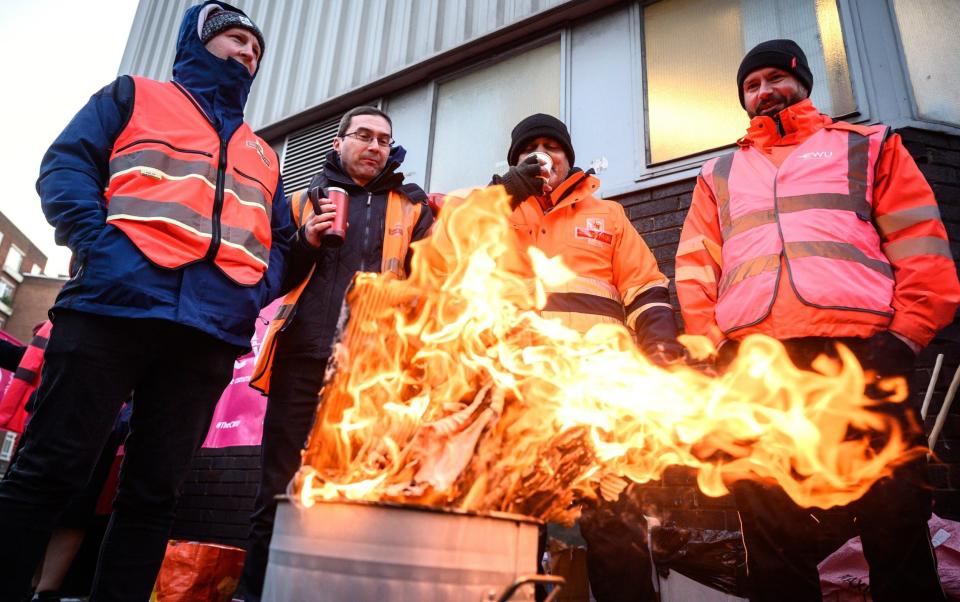Royal Mail workers are living in a 1970s dream world

There can be no clearer example of the wanton destruction that trade union chiefs are prepared to unleash in their ideological crusade than the fate that may be about to befall Royal Mail.
Faced with the growing fear that there will be no breakthrough in what has become Britain’s most bitter industrial dispute, Royal Mail bosses have begun to think the unthinkable.
The company has warned that it could place the regulated part of the business – which has a legal duty to deliver post to every address in the country – into a special form of insolvency if a compromise cannot be reached.
In many ways, this has been a long time coming.
Royal Mail’s board has tried almost everything in a bid to force the Commercial Workers Union (CWU) to soften its stance: warnings of mounting losses that jeopardise the future of the postal service; the possibility of many thousands of job cuts without modernisation; a threat to break the company up; and, most recently, an attempt to tear up a gold-plated contract that was signed when the company was privatised, essentially guaranteeing existing jobs and conditions.
Administration is the nuclear option, yet the suggestion that the responsibility for such drastic measures lies with the Royal Mail board is an outrageous distortion of events from the trade union.
“This is a direct result of mismanagement and recklessness at the most senior level,” it cried.
Wrong. If parts of the Royal Mail end up in the hands of a Government-appointed special receiver, then the CWU must accept the lion’s share of the blame.
It refuses to acknowledge there is even a need for modernisation when the case for change is overwhelming, and its pay demands have remained unreasonable and unrealistic throughout, resulting in little basis for any sort of real negotiation.
Instead, in the tradition of the trade union movement, it has chosen conflict, confrontation, and intransigence at every opportunity, using highly inflammatory language, and preferring to paint Royal Mail’s demands as a violent affront to the workforce and general decency, when in reality they are nothing of the sort.
At times, the CWU has appeared to revel in the disruption the strikes have caused, regardless of the damage inflicted on the Royal Mail or the upheaval to services.

Even at Christmas – when thousands of undelivered parcels and cards piled up at sorting offices across the country, in some cases for rats to feast upon – the trade union remained unapologetic.
Yet, amid all the concocted union outrage, it is easy to lose sight of what Royal Mail is actually proposing, which really isn’t that unreasonable at all.
On the contrary, if any organisation is overdue a thorough shake-up it is the Royal Mail, where swathes of the workforce remain stuck in a 1970s dream world, cosseted from today’s harsh commercial realities.
Among the key reforms that the company has proposed is compulsory Sunday hours, which would enable it to compete far better in an industry where super-fast online deliveries have become the primary battleground.
How egregious is this?
The Royal Mail’s Sunday service currently relies on staff volunteering, and shifts end in the afternoon. But the company points out that parcel deliveries occur mostly in the evening, and a seven-day operation has long been standard practice at rivals such as Amazon and DPD.
Changes to start times and flexible working are also on the table, in return for higher wages – hardly an "assault on postal workers," as the CWU claims.

After several sweeteners, the company has made a “best and final” pay rise offer of 9pc over 18 months, a proposal that the CWU has predictably rejected, on the basis that it represents “a devastating blow” to the livelihood of its 115,000 members.
In reality, it is nothing of the sort: it stands to be more generous than the average private sector salary hike, if predictions of an average 5pc increase for this year are correct, and even more so than the 3.5pc annual increase that public sector employees are tipped to receive.
And what the CWU conveniently forgets to acknowledge every time it issues another of its bellicose communiques is that Royal Mail posties already earn on average 40pc more than their counterparts.
The union hasn’t only rejected the company’s pay offer, but it has responded with a counter-proposal that sounds like it was written in a parallel universe: inflation-matching pay, reduced working hours, and lighter duties for anyone over the age of 55, as if someone in their mid-fifties is ready for a retirement home.
None of this is a surprise from a trade union whose power extends to having a say over which employees get the highly sought after shorter, less hilly routes.
Still, it doesn’t make such demands any more credible.
The CWU’s pay proposal alone would cost more than £1bn a year at a company that has already suffered a £200m hit from 18 days of strike action, and is expected to post a £224m loss next year, £100m worse than previous forecasts.
Surely, at this stage, members must be asking themselves whether the CWU is properly serving their interests, or putting its own first?
Perhaps the ultimate test is this: with Royal Mail at risk of being driven off a cliff, will union bosses try to pull it back from the precipice?
Or will they nudge the company over the edge and give themselves a pat on the back as it crashes into the ground?
